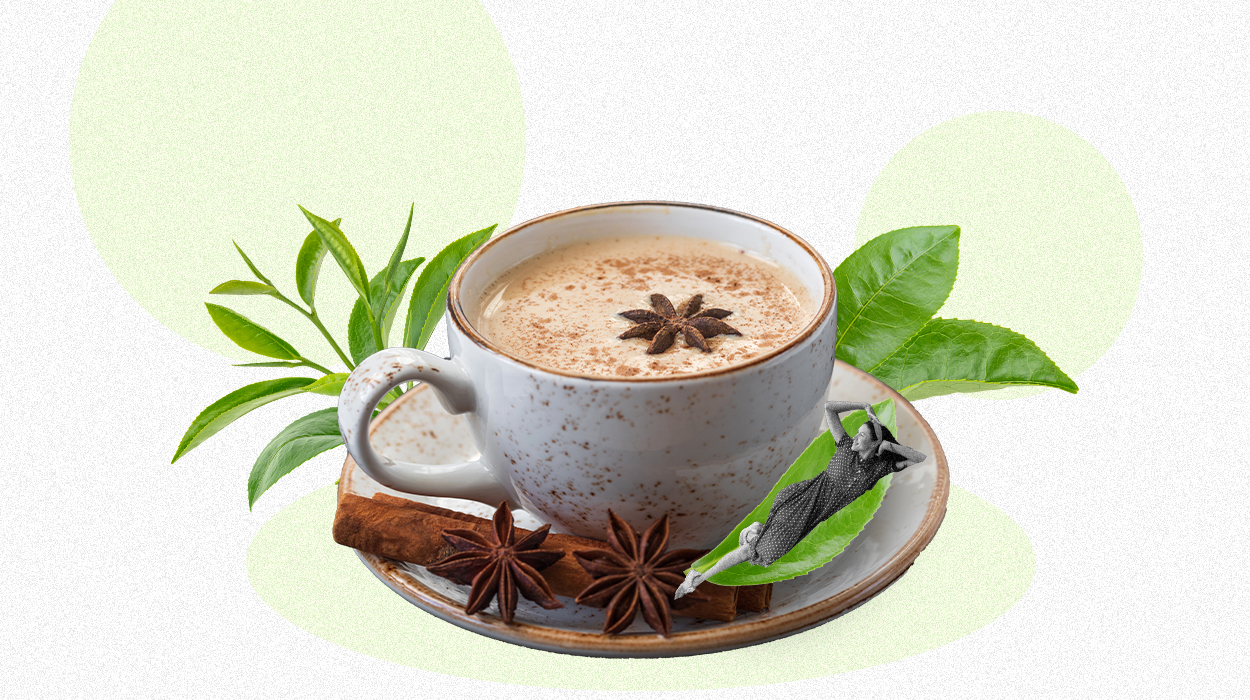 Expert's opinion
Expert's opinion
Expert's opinion
The article is a subjective view on this topic written by writers specializing in medical writing.
It may reflect on a personal journey surrounding struggles with an illness or medical condition, involve product comparisons, diet considerations, or other health-related opinions.
Although the view is entirely that of the writer, it is based on academic experiences and scientific research they have conducted; it is fact-checked by a team of degreed medical experts, and validated by sources attached to the article.
The numbers in parenthesis (1,2,3) will take you to clickable links to related scientific papers.
Chai Tea Benefits You May Not Know 2024: 10 Health Benefits

Do you feel the need to replenish your energy and fancy a beverage that will get your blood pumping? Do you feel bloated and lethargic after eating? There is a delicious and simple-to-make beverage that can help with all of these issues — chai tea.
What is it, and where does chai tea come from? Chai is a high-quality tea and one of the healthiest beverages to drink because of its rich and fragrant spices, including cinnamon, star anise, turmeric, and black pepper twists. Chai means tea with spices, usually made with black tea, although recipes may vary across continents.
Many people drink chai tea because they believe its mild spices and sugars are good for their overall health. It tastes great black and unsweetened and has a smoother flavor when mixed with milk.
Studies indicate that chai tea’s anti-inflammatory and immune-boosting properties make it a healthy beverage. Apart from these benefits, there are numerous ways in which chai tea can help your body. So, what is chai tea good for? Continue reading to learn more.
Health Benefits Of Chai Tea
Scented and spiced tea, masala chai is one of those soul-warming wellness teas that stays with you. The delicious drink contains antioxidants (such as cinnamon), anti-inflammatory compounds, polyphenols, vitamins, and minerals your coffee can’t stack up against. Potential masala chai tea benefits include[1]:
- Increases brain power
- Boosts the immune system
- Helps fight colds and flu
- Reduces oxidative stress
- Promotes heart health
- Reduces inflammation
- Improves digestion and reduces nausea
- Supports weight loss
- Lowers blood sugar
- Benefits the skin
- Increases the effectiveness of some antibiotics
Chai Tea Benefits
Although the ingredients of chai tea have not been studied as a whole, many positive health effects have been linked to the individual ingredients. According to scientific and accredited dietitians, the following are potential health benefits of drinking chai tea.[1]
Increases Brain Power

There is evidence that combining black tea and spices found in chai can improve brain health. According to studies, simply being in an environment with cinnamon can improve cognitive performance.[2] The two ingredients linked to increased concentration levels in black tea are caffeine and the amino acid L-theanine.
Lowers Blood Sugar
Since chai is considered a black tea,[3] it can help manage glucose and prevent blood sugar spikes. It is especially useful for lowering blood glucose levels after consuming sugary beverages.
Boosts The Immune System
The immune system is another area that can benefit from drinking chai tea. Chai tea’s active ingredients have been shown to boost the immune system. In particular, chai tea’s high vitamin C and zinc concentration may make it helpful in maintaining a healthy immune system.
Vitamin C promotes proper immune system function[4] and protects cells from free radical damage. Vitamin C also aids the immune system in its fight against illness. Zinc, which may be present in chai, is necessary for proper immune function and aids in preventing cell damage. Zinc is also beneficial in the prevention of infections.
Helps Fight Colds And Flu
Catechins, an ingredient in chai tea bags, have been shown to boost the immune system.[5] Chai tea’s antiviral properties can benefit those suffering from the flu or a cold. Antioxidants aid the immune system in fighting off infections and reduce the inflammation that often accompanies such infections. When suffering from a cold or the flu, it is advised to drink chai tea in moderation.
Reduces Oxidative Stress
L-theanine,[6] an amino acid found in chai leaf tea, has been shown to have relaxing and stress-relieving properties. L-theanine can help people feel better emotionally and reduce stress by increasing dopamine and serotonin levels in the brain, the mood-regulating hormones.
Promotes Heart Health
Drinking black tea has been linked to a lower risk of developing heart disease, most likely due to the polyphenols and flavonoids found in the beverage’s antioxidant action. Antioxidants like these may help lower risk factors for cardiovascular diseases, such as high blood pressure and cholesterol levels.
Reduces Inflammation
Chai tea’s antioxidant properties make it effective at reducing inflammatory responses. According to research, oxidative stress[7] is a factor that contributes to inflammation. Fortunately, the traditional spices used to make chai latte have anti-inflammatory properties that can potentially prevent the production of cytokines, substances in the body that promote inflammation.
Improves Digestion And Reduces Nausea
Ginger, a component of chai tea, has been shown to have anti-nausea properties. The antibacterial properties[8] of chai spices such as cinnamon, cloves, and cardamom may aid in the prevention of bacterial infections that cause nausea and gastrointestinal distress.
Supports Weight Loss
Regular consumption of chai teas can aid in weight loss by increasing metabolic rate. Studies[9] have shown that the catechins present in vanilla chai tea benefit a person’s metabolic rate. In addition, research suggests that consuming chai tea can help you feel fuller for longer, thereby reducing your hunger pangs. This, in turn, may make controlling your food intake feel like less of a chore.
Chai Tea Benefits For Skin

Free radical exposure to toxins has a wide range of consequences, including cellular damage and the development of health problems. Fortunately, a cup of chai tea regularly has been linked to improved skin health.[10] Flavonoids, which are abundant in chai tea, are antioxidants that have been shown to protect cells from damage.
Is Chai Tea Good For You?
Certainly, chai tea can potentially improve the quality of life. Many different spices, including black tea, ginger, cinnamon, cloves, and cardamom, go into preparing chai. Depending on the spices used and how it’s brewed, chai tea can positively impact one’s health.
The fragrant, spicy tea helps with weight loss, digestion, blood sugar control, and cardiovascular health.[11] Its low-calorie content makes it a healthy substitute for sugary drinks like hot chocolate and apple cider. While many of these chai lattes’ healthy benefits have been demonstrated scientifically, it is crucial to remember that the benefits are not from the chai tea itself but rather from the ingredients used to make it, such as cinnamon, ginger, fennel, peppercorns, cloves, and nutmeg.
Nutrition Facts
Chai tea is made from four simple ingredients: water, spices, milk, and your favorite sugar or sweetener. A cup of sweetened chai tea contains around 120 calories, whereas an equal amount of unsweetened chai tea contains zero calories. Several sources may give you varying estimates.
Spices and tea are insufficient to meet nutritional requirements on their own. While the water and spices have no calories, the milk and sweetener do—and the precise amount of each choice used can have more or fewer calories.
Below is the correct nutritional information for one cup (240 grams) of hot chai tea, as listed in the United States Department of Agriculture National Nutrient Database.
- 120 kilocalories
- 9.6 milligrams cholesterol
- 2.4 grams fat
- 3.8 grams protein
- 48 milligrams sodium
- 22 grams carbohydrates
- 146 milligrams calcium
- 1.2 micrograms of vitamin D
- 0.1 milligrams iron
- 221 milligrams potassium
Dosage And Safety
Chai tea is widely recognized as a safe beverage. However, opinions differ on how much chai tea concentrate the average person should drink daily to gain the health benefits discussed above.
Although chai green tea has been extensively investigated for its health benefits,[10] most research has focused on individual components, making it difficult to predict the quantity required to achieve the desired effects. As a result, the ideal dose has not yet been established.
The Bottom Line
After weighing the benefits of chai against its side effects, it’s easy to see that the pros outweigh the cons. We want you to know that most people can safely include this beverage in their diet if you’ve been considering doing so.
But, as with any substance, moderation is key to avoiding any possible side effects. Before consuming any chai tea blends, expectant mothers should talk to their health professionals to find out if it is safe for them and their developing babies.
+ 11 sources
Health Canal avoids using tertiary references. We have strict sourcing guidelines and rely on peer-reviewed studies, academic researches from medical associations and institutions. To ensure the accuracy of articles in Health Canal, you can read more about the editorial process here
- Hayat, K., Iqbal, H., Malik, U., Bilal, U. and Mushtaq, S. (2015). Tea and Its Consumption: Benefits and Risks. Critical Reviews in Food Science and Nutrition, [online] 55(7), pp.939–954. doi:https://doi.org/10.1080/10408398.2012.678949.
- Pasupuleti Visweswara Rao and Siew Hua Gan (2014). Cinnamon: A Multifaceted Medicinal Plant. Evidence-based Complementary and Alternative Medicine, [online] 2014, pp.1–12. doi:https://doi.org/10.1155/2014/642942.
- Arisa Butacnum, Rewadee Chongsuwat and Akkarach Bumrungpert (2017). Black tea consumption improves postprandial glycemic control in normal and pre-diabetic subjects: a randomized, double-blind, placebo-controlled crossover study. PubMed, [online] 26(1), pp.59–64. doi:https://doi.org/10.6133/apjcn.112015.08.
- Carr, A.C. and Maggini, S. (2017). Vitamin C and Immune Function. Nutrients, [online] 9(11), pp.1211–1211. doi:https://doi.org/10.3390/nu9111211.
- Bae, J., Kim, N., Shin, Y., Kim, S.-Y. and Kim, Y.-J. (2020). Activity of catechins and their applications. Biomedical dermatology, [online] 4(1). doi:https://doi.org/10.1186/s41702-020-0057-8.
- Li, M., Liu, H., Wu, D., Kenaan, A., Geng, F., Li, H.-B., Anil Gunaratne, Li, H. and Gan, R. (2022). L-Theanine: A Unique Functional Amino Acid in Tea (Camellia sinensis L.) With Multiple Health Benefits and Food Applications. Frontiers in Nutrition, [online] 9. doi:https://doi.org/10.3389/fnut.2022.853846.
- Hussain, T., Tan, B., Yin, Y., François Blachier, Carine, M. and Najma Rahu (2016). Oxidative Stress and Inflammation: What Polyphenols Can Do for Us? Oxidative Medicine and Cellular Longevity, [online] 2016, pp.1–9. doi:https://doi.org/10.1155/2016/7432797.
- Liu, Q., Meng, X., Wang, Y., Zhao, C., Tang, G. and Li, H.-B. (2017). Antibacterial and Antifungal Activities of Spices. International Journal of Molecular Sciences, [online] 18(6), pp.1283–1283. doi:https://doi.org/10.3390/ijms18061283.
- Tang, G., Meng, X., Gan, R., Zhao, C., Liu, Q., Feng, Y., Li, S., Wei, X., Atanasov, A.G., Corke, H. and Li, H.-B. (2019). Health Functions and Related Molecular Mechanisms of Tea Components: An Update Review. International Journal of Molecular Sciences, [online] 20(24), pp.6196–6196. doi:https://doi.org/10.3390/ijms20246196.
- Khan, N. and Mukhtar, H. (2013). Tea and Health: Studies in Humans. Current Pharmaceutical Design, [online] 19(34), pp.6141–6147. doi:https://doi.org/10.2174/1381612811319340008.
- Deka, A. and Vita, J.A. (2011). Tea and cardiovascular disease. Pharmacological Research, [online] 64(2), pp.136–145. doi:https://doi.org/10.1016/j.phrs.2011.03.009



